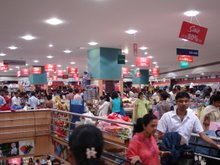Ranbaxy, Jupiter Bioscience to sign 10-year marketing deal
 Jupiter To Get Share Of Profits, More Exposure In International Markets
Jupiter To Get Share Of Profits, More Exposure In International Markets
RANBAXY Laboratories is about to enter into a 10-year co-marketing agreement with Jupiter Bioscience to tap the $6-billion global peptide pharmaceutical market. The specialised organic compounds manufacturer will initially licence out to Ranbaxy Lab five generic peptide drugs in anti-cancer, anti-diuretic, osteoporosis and growth hormones segments, worth $3 billion at innovator’s prices. According to sources, the Ranbaxy will also pick up 3.2 million equity share warrants on preferential basis in the Hyderabad-based company — adding up to 14.9% post expanded equity after qualified institutional placement and post conversion of 1.75 million promoter warrants into equity shares. “This tie-up will allow us to rapidly bring our products to international markets, as Ranbaxy has a large marketing presence in semi-regulated and regulated markets across the world,” said Jupiter Bioscience chairman and managing director Venkat R Kalavakolanu. Under the terms of agreement, profit on sales will be shared between the two companies. “Jupiter Bioscience will, however, retain rights to market the drugs on its own or with another partner in different markets,” said Mr Kalavakolanu. When contacted, a Ranbaxy Lab’s spokesperson said: “We have entered into an in-principle agreement with Jupiter Biosciences for a global supply arrangement subject to due diligence.” He, however, refused to comment further on the development. The peptide market, estimated at around $6-7 billion, represents a significant opportunity for generic players. It is estimated that peptide drugs worth $3 billion (at innovator’s price) will go off patent in the next four years. Besides, at a time when the US and European generic markets continue to reel under increasing pressure and ever-rising competition, price erosion for generic peptide drugs remains relatively low. Generic versions of peptide drugs are typically launched at around 70% of the innovator’s price,” said Mr Kalavakolanu. According to analysts, price erosion in the US commodity generic market would stand anywhere between 85% to 98%. “High technology barriers limit the entrance of new players in the peptide space,” said Mr Kalavakolanu. Sun Pharmaceuticals and Cadila Pharmaceuticals count among the few other Indian players present in this segment. The global peptide market is expected to continue to grow significantly in the next few years. “Currently, there are globally 270 new peptide drugs under clinical development and 400 in pre-clinical studies,” said Mr Kalavakolanu. According to the company, the global market for peptide drugs could reach $10 billion in the next three years. Jupiter Bioscience’s shares were up 9.98% at 162.05 on BSE on Monday.
Courtesy: EconomicTimes

No comments:
Post a Comment